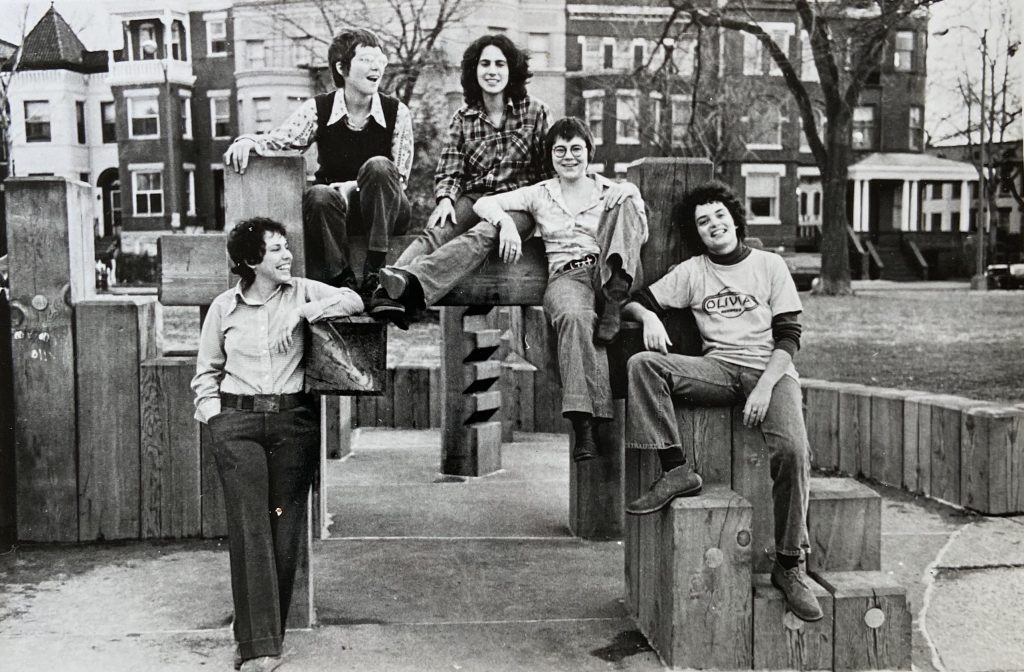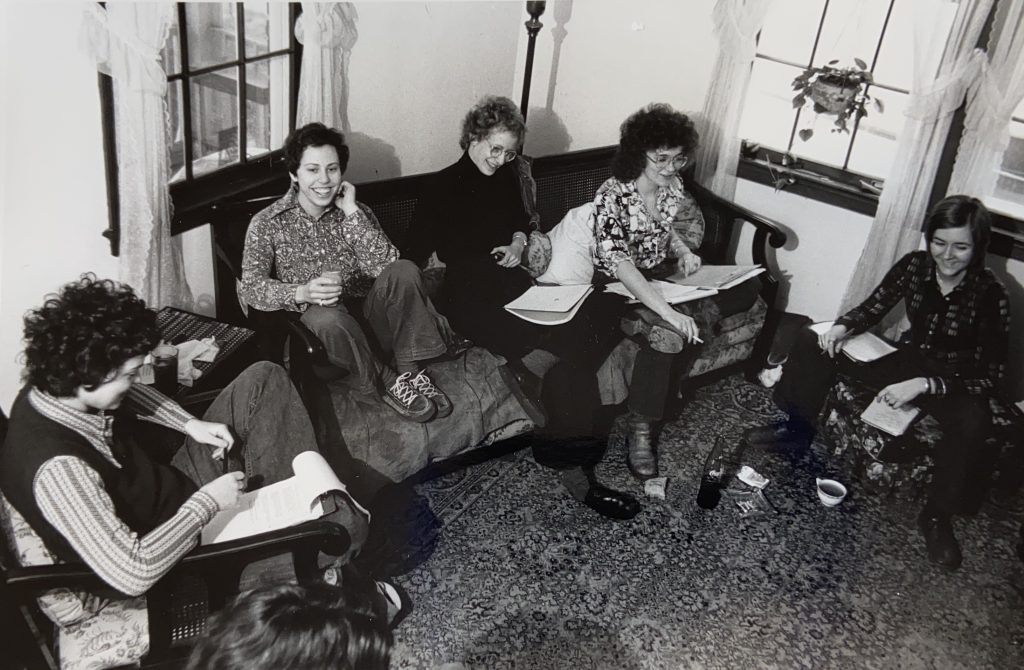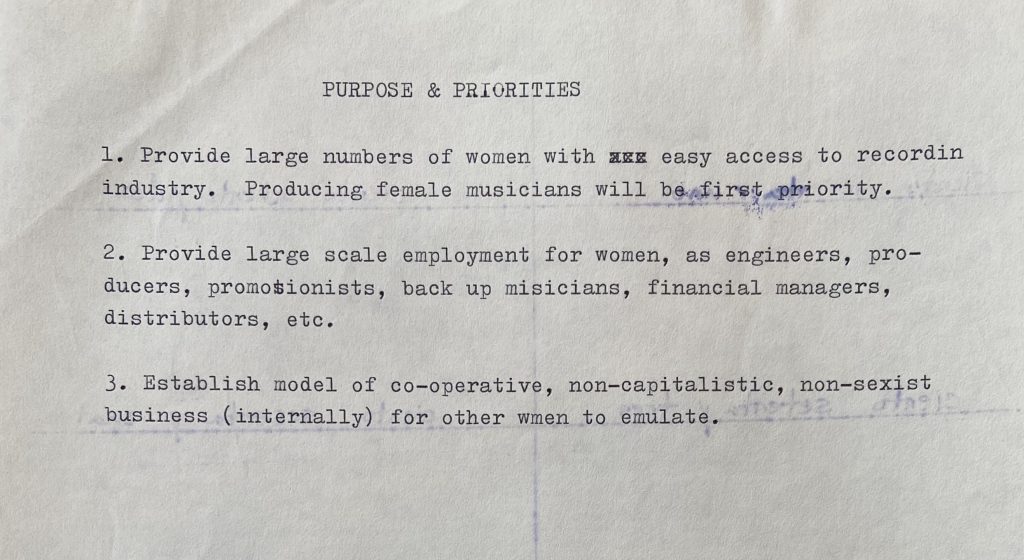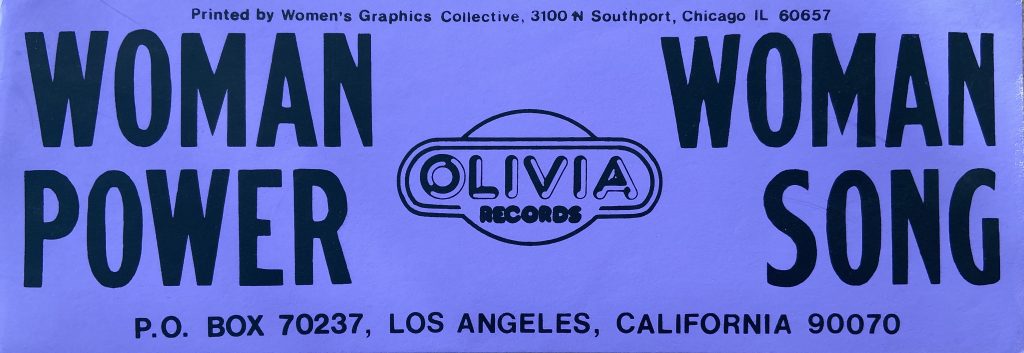In early 1973, a group of ten lesbian women with a vision gathered in a house in Washington, D.C. They came from different walks of life but all were struggling to make their voices heard in the male-dominated music industry and in heteropatriarchal society at large, and all wanted to create change for women. When one woman suggested, ”Why don’t you start a women’s record company?,” that vision became a plan.

The core five Olivia women: Kate Winter, Jennifer Woodul, Judy Dlugacz, Meg Christian, Ginny Berson; c. 1974. Sophia Smith Collection, Ginny Berson Papers.
Bringing together their varied backgrounds as activists, political theorists, and folk performers, this group of radical lesbian feminist women formed Olivia Records as a national women’s recording company initially based in Washington, D.C. 1
Feminism and Lesbian Feminsim
The early 1970s saw the emergence of the lesbian community in conjuction with the women’s liberation movement as a newly visible political force, eager to take a stand and see themselves represented.
Lesbians had often found themselves excluded and themselves and their needs marginalized in the gay liberation movement and the women’s movement. Prominent figures in the women’s movement like Betty Friedan, the founder of the National Organization for Women (NOW), had long attempted to exclude lesbians from feminism, calling them the “lavender menace”. Friedan feared lesbianism would give feminism a bad name and warp the image of the movement 2.
Yet at the same time, a younger, more radical part of the women’s movement–the women’s liberation movement–welcomed and celebrated lesbian feminism. This newfound openness was liberatory for both older and younger lesbians–it offered an opportunity to embrace the label of “lesbian” with pride, it encouraged them to come out, and it gave them a safe space to explore their lesbianism. 3.
Two of the women at the center of Olivia Records, Ginny Berson and Jennifer Woodul, had been part of the Furies, a radical lesbian separatist collective based in D.C. that published a newspaper and advocated communal living apart from men. The Furies were deeply involved in developing a politics of lesbian feminism, and Berson and Woodul carried those political priorities into their work creating Olivia Records.
the Olivia vision
Olivia Records was a key part of the emerging genre of what would come to be called women’s music, music that centered women and women’s experiences. As a genre, women’s music drew lessons from the civil rights movement and the significance of Black freedom songs and protest music to the movement. 4
As one of the foremost women’s music record companies operating at the national level, Olivia Records created and distributed music for women–especially lesbian women–and by women. In starting out, their three central goals (laid out in their internal “Purpose & Priorities” document above) were to record and distribute high-quality music by women, to create opportunities for women‘s employment, and to organize themselves and their company in a model that was feminist and anti-capitalist, and that could be emulated.
In a recent memoir of the Olivia Records years, Ginny Berson described how she saw the Olivia vision in the broader workings of the women’s movement:
“…there was a part of the women’s movement of the 1970s that was visionary, revolutionary, anti-racist, and very grounded in women’s real needs and aspirations. We understood that culture and politics were not separate, that each was informed by the other and, when consciously united, created a much more powerful force for change. We were going for hearts and minds. We did not want a piece of the ‘the pie,’ which we considered poisoned, contaminated by greed and the need to dominate. We wanted a whole new pie, filled with love and justice and with enough for everybody.” 5
As they grew their company, the women of Olivia built up a national network of communities of women united in celebrating and supporting women through the powerful medium of song.
In 1974, they moved their entire operation to L.A. and started to build the business of Olivia Records from scratch. In an era before the internet, reaching people and getting the word out about small companies like Olivia Records was much more challenging. The letter above introducing Olivia Records was sent to the mailing list the Olivia women were compiling, a list of all the women they could think of who might be supportive, willing to donate some funds, and whose addresses they had. 6 With this letter, the founding Olivia women laid out a brief statement of their mission and the kind of skilled women they were looking to bring in.
The first record produced by Olivia, a 45 rpm single, had Meg Christian’s cover of Carole King’s “Lady” on one side, and Cris Williamson, a folk singer from California, singing her own song, “If It Weren’t for the Music,” on the other–performances that both women donated. The 45 served as a fundraiser, a sample of the Olivia vision and the quality Olivia aimed to produce, that would be sent out to women in the music industry and the public. 7
- Bonnie J. Morris, “How Should We Archive the Soundtrack to 1970s Feminism?,” Smithsonian Magazine, March 30, 2018, https://www.smithsonianmag.com/arts-culture/how-should-we-archive-soundtrack-1970s-feminism-180968637/. ↩
- Lilian Faderman, The Gay Revolution, (New York: Simon & Schuster, 2015), 233-235 ↩
- Ruth Rosen, The World Split Open, (New York: Penguin Books, 2006), 164 ↩
- Bonnie J. Morris, The Disappearing L, (Albany, NY: State University of New York Press, 2016), 25-26 ↩
- Ginny Z. Berson, Olivia on the Record, (San Francisco: Aunt Lute Books, 2020), 15 ↩
- Berson, 82 ↩
- Berson 78, 87 ↩



